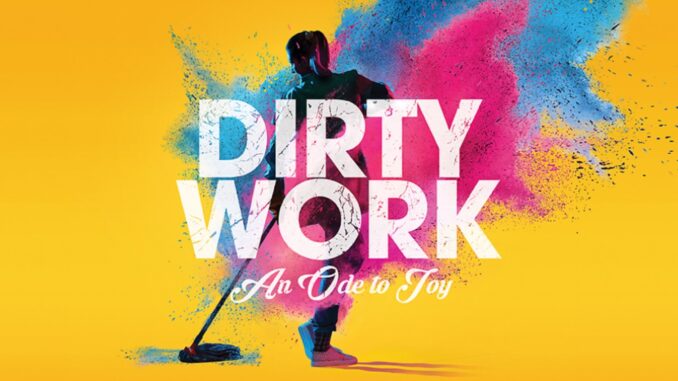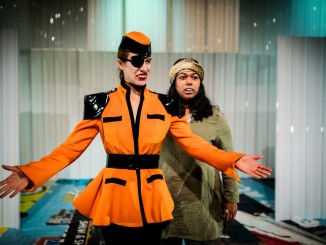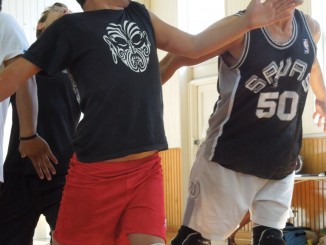
The absurdity of work is a central theme explored in Indian Ink’s new production Dirty Work which premiered on the Rangatira stage at Q Theatre last Friday night. Written by Indian Ink founders and creative collaborators Jacob Rajan & Justin Lewis, the production is inspired by Camus’ The Myth of Sisyphus and explores the meaninglessness and repetitiveness that often constitute the daily grind of our contemporary working lives.
The play is set in an office of the Auckland branch of Sisyphus international, an international business conglomerate whose head office is in India’s tech capital Bangalore. The basic set design by John Verryt, comprises several office cubicles interspersed with plastic potted plants and partitions spray painted with bright and gaudy lines of red, yellows and greens. The set also includes a manager’s desk downstage left and backdrop on which has been painted simple and stylised office windows. The first worker we meet is Joy the cleaner, wonderfully portrayed by Catherine Yates, who enters and bins the wrappers, fast food packages and yoghurt containers left strewn at the workstations. The slightly incompetent but exuberant office manager Neil (Justin Rogers) then enters and explains that all the office workers have been called in early to reconcile the accounts in time for an important board meeting. He is joined by his office assistant and secret romantic interest Zara (Tessa Rao) who has just returned from travelling in India and is still itching to continue her travels overseas. The office workers start trailing in only to discover that all the computers are missing and a phone call to Bangalore reveals that they are being replaced as part of an upgrade. A moment later the company founder of Sisyphus, Vijay Kumari (voiced by Jacob Rajan), makes a video call informing the office manager that he needs key data for the upcoming board meeting. Unperturbed by the lack of computers and sensing this could be his big break, Neil rallies the troops insisting that ‘the pen is mightier than the sword’ and asking his team to complete the manual reconciliation and crunch the numbers required to impress his boss and potentially secure the future of the Auckland branch.
An interesting feature of the production is the presence of a choir whose members change every night and who perform the roles of the office workers. The choir members have only rehearsed the songs and presumably have been instructed on key actions related to a few important queues. Other than this, they haven’t read the script and seem to play along with the pretence and the action as it unfolds. An interesting ‘live’ and ‘improvised’ dynamic emerges as a result as the main actors interact briefly with different members of the choir. Another perhaps unintended consequence of this is a slight disjointedness between the understated naturalism of the real choir members portraying office workers and the physical comedy that is part of Indian Ink’s house style and which is informed by clowning and mask traditions. Justin Rogers in the main lead as Neil is obviously a talented physical performer but his performance in contrast to the non-actorly choir cast is slightly caricatured as a result – something that Justin Lewis’ direction should have resolved in rehearsals. Regardless, the inclusion of the Choir results in entertaining theatre and it’s great to see bodies on stage and to hear live voices providing musical interludes that give space to the drama and featuring songs such as Beethoven’s Ode to Joy, a cover of Lorde’s Royals, and Rahmann and Clark’s Jai Ho.
The clever and funny script by Rajan and Lewis offers a good scenario for an absurd drama to develop. The repeated video calls by the head boss Vijay and the lack of the computers and the basic tools needed to complete the required tasks helps to build the dramatic tension that drives the drama and also provides moments to flesh out the depth of characters. In a conversation with Neil, the boss Vijay confides that once his work was about happiness, but that he doesn’t know what the point of the company and his work is anymore. Neil points out that the view must still be good from the top of the ladder, but Vijay tells him that the ladder is curved and that the further you climb the more curved it becomes until eventually you realise it’s just a wheel that you go around and around on until you wake up and don’t recognise yourself anymore. When Neil asks, “is that because you’ve lost sight of your dreams?”, Vijay answers, “No. It’s because you’ve become a fat fucking hamster!” When the cleaner Joy accidentally answers a call from Vijay we learn that Vijay’s mother used to be a cleaner and that he has a softer side and there is comfortable and funny repartee between the head boss and the lowest paid employee. Zara also sympathises with Joy, with whom she shares her recent travel experiences, parts of her Indian heritage and her critique of the caste system in India which she describes as a system that traps people within social classes and one that everyone just accepts. This is delivered with obvious ignorance of the economic disparity and precarity that entraps workers like Joy.
The play could have gone further in its critique of economic working conditions and the intercultural comparisons that it sets up. Rajan explains in the programme that 85% of the world’s one billion full-time employed are unhappy at work. The play explores the struggle of having to complete repetitive and meaningless tasks through the character of Joy– there is only so much personal fulfilment that can come from constantly cleaning a blocked toilet. In contrast to Camus’ absurdist philosophy, Zara’s character offers the potential of an Eastern philosophical view on work through notions of Raja Yoga or ‘jihad’ in Islam which suggests that enlightenment can be achieved by single-minded focus and absorption into a single activity. These intercultural comparisons are hinted at in the play, but they aren’t explored to their full potential. Furthermore, the play seems to miss an opportunity to comment on the importance of ‘craft’ and a celebration of the skill that comes from the commitment to doing a single job and doing it well. A critique of working conditions and the lack of entitlements some of the most precarious of our workforce experience is similarly present but not explored to its full potential. Joy more than others, understands that work is simply a means to an end – a necessity to help her support her family. These issues would seem to be timely given the E Tū union launched a campaign in April to secure fair pay agreements for cleaners and to improve their working conditions. However, the play only touches on these issues, and while Joy delivers strong lines in the play that challenges the assumptions of her ‘fellow’ workers, in the end she is depicted as enjoying her time alone at home before the kids arrive, making any commentary on workplace or structural inequities in our system redundant.
Dirty Work is an entertaining piece of theatre with compelling characters that is set for a national tour. The clever script manages to include a large cast and the production has something to say about the absurdity of contemporary work. While the production might not deliver on its philosophical and political potential, there is a lot here to inspire and provoke audiences.
Dirty Work plays Rangatira, Q Theatre 16th of June – 2nd of July 2023.




Leave a Reply